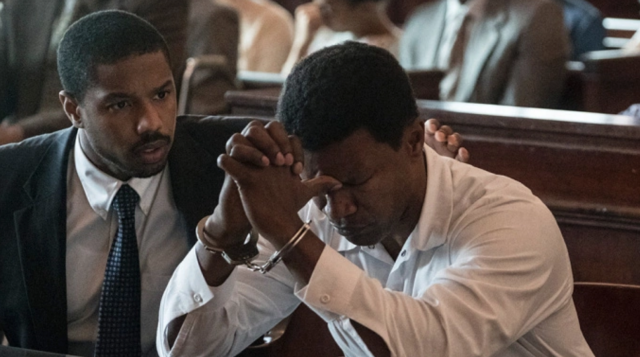Just Mercy: Long Term, by David Bax

After a touching prologue in which a law student and intern named Bryan Stevenson (Michael B. Jordan) nervously makes his first visit to a death row inmate, Destin Daniel Cretton’s Just Mercy quickly jumps ahead to a more seasoned Stevenson, now practicing law, moving to Montgomery, Alabama to establish an organization to defend prisoners condemned to death. We learn this in a rushed bit of exposition from Eva Ansley (Brie Larson), the organization’s co-founder. We also learn from her, helpfully, that the death penalty is bad. Just Mercy‘s self-interested sheen of concern would be obvious in any case but, on the heels of Chinonye Chukwu’s exceptional Clemency, a film that lets you experience the nauseous immorality of state-sanctioned murder instead of giving you a smug lecture about it, Cretton’s film feels downright insulting.
Just Mercy focuses almost exclusively on one of Stevenson’s cases, that of Walter McMillian (Jamie Foxx), who was arrested and convicted on murder charges based on unreliable testimony from white witnesses and despite the fact that dozens of black witnesses saw him elsewhere at the time of the killing. Stevenson and Ansley square off against a new district attorney (Rafe Spall) and a community more than content to consider the issue of the crime put to rest following a black man’s death sentence.
Unlike Clemency, which stuck mostly to the interior working and living spaces of its characters, Just Mercy seeks to capture its specific Southern setting. This ends up being one of the things it does well. Going beyond particulars like all types of soda being referred to as “coke,” we see the stubborn hypocrisy of a place that touts the Harper Lee museum as a “civil rights” monument while ignoring the former slave market along the Alabama River.
Cretton’s other big win is in casting. Dialogue as unwieldy with information and insistent in pathos as Just Mercy‘s goes down easier when spoken by this caliber of actors. The supporting cast of Foxx, Larson and Spall is rounded out with solid turns from O’Shea Jackson, Jr., Rob Morgan and Tim Blake Nelson. But Jordan has the heaviest burden–and is the most successful–with a character arc that depicts an initially over-promising idealist who butts up against frustrating realities but never gives in to cynicism.
It’s a shame the same can’t be said of Just Mercy, a movie that doesn’t trust its audience to draw the conclusion it wants and so appears to cherry pick from the real Stevenson’s many cases the ones that will most easily rig the ultimate impact. The deck thus stacked, Cretton is (to mix metaphors) free to set ’em up and knock ’em down when it comes to narrative beats, an approach better suited to thrillers and mysteries than films about the lives of real men and women.
In other ways, though, Cretton seems too frightened to do wrong by his subjects. Just Mercy becomes interesting when it flirts with fatalism, reminding us that all the righteousness in the world is no match for ignorance, especially when it’s possessed by those in power. But Cretton is too keen on sanitizing to commit to such pessimism. At a crucial moment, he looks away from an execution, the very thing he is ostensibly condemning. A little bit of false dignity is no salve for injustice.



























